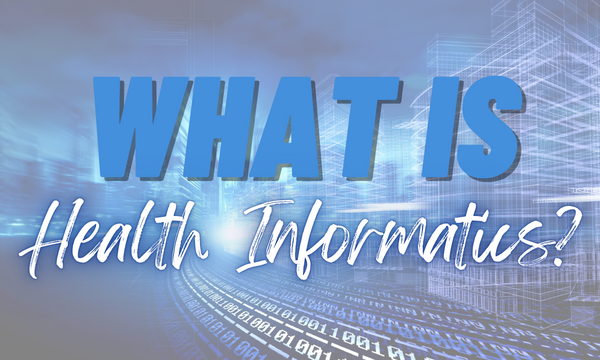The healthcare informatics job sector is one of the fastest growing careers in the US. In fact, jobs in healthcare informatics are expected to grow, between 2014 and 2024, by 15%.
This is in large part due to several factors: the move to electronic health records (EHRs), which has now been mandated by the federal government, as well as the US population getting older, which creates a greater need for medical services.
There are many options available, whether you want to work in public health, dental care, or biotech. They may seem to vary, but all of these jobs include the combination of information and data with healthcare industry work.
If you’re considering starting a career in healthcare informatics, you may not be entirely sure where to start. You may be overwhelmed with all your choices.
That’s why we’ve put together this guide. To learn more about the job titles, job descriptions, and salaries, read on.

Information on the Industry and Jobs
Because this industry is changing so quickly, there are many opportunities for work, but not that many people who are qualified to work in those roles. Therefore, there’s a vacuum in the employment sector. This is exactly why it’s a great field to be interested in.
Once you have the right education and experience under your belt, there will be plenty of opportunities for you. Some of these roles may require a Master’s or a PhD, while others will require other kinds of training.
Considering that the average salary for people with these skills is $192,157, it’s well worth the investment of your time and money.
Whatever your interest, you can find a healthcare organization where you can put these skills to use. Even if your interest is niche–such as being a veterinarian–you can complement that work experience with the new informatics skills you have to improve your career and bring up your salary.
Generally speaking, these roles will involve working with health data and information so that you can improve the workings of healthcare organizations and understand how diseases and health work on a larger scale.
Salaries in Healthcare Informatics Jobs
As with many careers, the salary you’ll make in the healthcare informatics job sector will vary depending on where you’re based. However, because of high demand and the skills required, health informatics salaries are often high. Even if you’re starting a new job that is on the lower end of pay, you can still make a high salary.
Whether you’re interested in becoming a health informatician or a data scientist, you can do quite well. Career outlooks are quite promising.
According to Indeed, the average salary can range from $63,068 per year to $125,192 per year–and average yearly salaries can include:
- Data Scientist: $123,440
- Clinic Manager: $79,517
- Clinical Specialist: $70,775
Careers in Healthcare Informatics Jobs
If you’re looking to begin a career in healthcare informatics, you’ll want to get the proper training.
This means getting the right education in terms of leadership skills, administration in the health sector, medical knowledge, and IT. Often, doing this will include getting a Masters degree, so that you can complement the education you already have.
It’s worth it, given that the average health informatics salary in the US is $85,787 a year.
Do it now; you won’t regret it. There are many opportunities, in many different roles, and you’re sure to find one that’s the right fit.
Top Positions in the Healthcare Informatics Industry
To learn more about the different opportunities available, check out this list of healthcare informatics jobs and salaries.
Informatics Nurse
According to Zip Recruiter, the average salary for this position is $102,230 a year.
Informatics nurses are in charge of determining what changes need to be made so that IT and clinical are working together properly and effectively. For example, if a hospital could benefit from using the implementation of a technical program, an informatics nurse will ensure it is instated.
Informatics nurses are also in charge of training. So, if the technical program involves this, they will help staff get their heads around the new technology. Informatics nurses also bridge the gap between the staff, IT, and vendors.
You will also answer any questions related to technical programs and software, and you may manage some projects.
In this role, you are less likely to be working directly with patients, since you will be managing so much technological information. Instead, you will be ensuring that systems work in such a way that patient care is at its best. If you are looking for remote work, this can be a great choice.
Health Care IT Project Manager
According to Payscale, the salary for a Health IT Project Manager position is $99,924 a year.
A Health Care IT Project Manager works with healthcare organizations as a manager, so that they can ensure that any IT projects taken on are carried out in an organized, effective manner. This may involve, for example, managing timescales, so that the goals of the project are completed on time.
At the beginning of a project, a Health Care IT Project Manager will plan out the entire IT project, working with the healthcare organization so that tasks can be completed by staff as needed. If changes to the plan are needed, the Health Care IT Project Manager will make adjustments to the schedule and assign tasks throughout, changing milestones and end goals along the way.
Director of Clinical Informatics
The average salary for a Director of Clinical Informatics is around $107,057 a year, according to Neuvoo.
Responsibilities in this position are quite high, which explains the high pay. A Director of Clinical Informatics will work in the actual application of IT services and programs in a healthcare organization.
This means really getting into the inner workings of these programs, so that there is a timely and efficient delivery of electronic medical records when needed by healthcare organizations. In addition, a Director of Clinical Informatics has to ensure that these records are updated, and that their delivery is smooth and consistent.
This is a leadership position. While specifics to the role can be different depending on where the Director of Clinical Informatics works, a responsibility that they all have is constantly supervising the changes in the use of electronic health records.
For this reason, an education in these EHR and IT is incredibly important, and often employers will expect applicants to have at least a bachelor’s degree, with a preference for a Master’s degree in the field.
Health Informatics Consultant
When it comes to the average salary of a Health Informatics Consultant, it’s $73,110 a year, according to Glassdoor.
A Health Informatics Consultant helps healthcare organizations through a consultancy role, which makes it easier for these organizations to meet the federal requirement of transitioning to EHRs without having to pay someone on-staff. This is the ideal position for someone who prefers to work independently and with a variety of organizations.
Health Informatics Consultants usually provide many different services, and work on many different projects at a time. Responsibilities may include training teams so that they understand IT implementation, and putting systems in place, ensuring that they work without any issues.
They also may work on finding the right software for an organization and installing it correctly, and ensuring that networks are updated and secure as needed.
Health Informatics Director
According to Payscale, the average salary for a health informatics director is $66,698 a year.
Health Informatics Directors have many responsibilities and at a high level, because it is a senior-level role.
A Health Informatics Director is in charge of not only all technology implementation in a healthcare organization, but also in managing the people using that technology. Additionally, they are in charge of ensuring that data is shared throughout different parts of the organization in a way that is streamlined and effective.
Any health information data that is shared in the organization is overseen and managed by the Health Informatics Director, with the goal of making patient care as successful as possible. Therefore, a Health Informatics Director is involved both with the success of goals on the patient side as well as the IT side. This means that they must oversee internal processes, updating them as needed when new software or technologies are introduced.
Because this is a senior-level role, applicants for this role should have at least a Master’s degree, and ideally a PhD, along with nearly ten years of relevant experience.
Clinical Analyst
The average pay for a clinical analyst is $74,873 a year, according to Zippia.
Clinical analysts are in charge of looking at data created by IT technology so that they can ensure a healthcare organization is giving the best possible care with the use of these technologies.
This involves analyzing data to understand whether information systems are working properly and impacting workflow positively. It also involves creating a database system specifically designed for the healthcare organization and maintaining it.
Finally, it is important to understand the importance of confidentiality, since much data will be handled to meet the needs of the healthcare organization while also following government-mandated standards.
Because this role involves a deep understanding of both IT and healthcare, it requires a lot of education. When applying for a Clinical Analyst position, you will be expected to have a bachelor’s degree in social science, life science, or a degree in a similar field. You will also need to have a technology-heavy education.
You may need a master’s degree, and a nursing degree or prior experience in the healthcare industry is important too.
Medical Coder
The average salary for a medical coder in 2018, according to FlexJobs, was between $35,520 and $53,470.
A Medical Coder is an essential person in a healthcare organization. They look at patients’ files, analyzing the information there based on the universal codes that have been put there. They translate this information, which can include anything from diagnoses to what care the patient has received, so that it is understood by insurance companies.
This is important because it makes it possible for a healthcare provider to then bill the insurance company and patient correctly.
In terms of education, Medical Coders are expected to memorize the different medical codes used in the industry. It is also important to have a basic understanding of healthcare, as well as the different practices carried out by insurance companies.
Other Healthcare Informatics Jobs
Below, you can learn a bit more about other opportunities in the healthcare informatics sector. As you can see, these are at different levels and in different areas of health, so the options are nearly endless.
- Chief Information Security Officer
- Chief Information Officer
- Clinical Documentation Improvement Specialist
- Clinical Informaticist
- Clinical Informatics Nurse
- Clinical Informatics Specialist
- Clinical IT Analyst
- Clinical Systems Technician
- Data Analyst
- Data Scientist
- Digital Transformation Consultant
- EHR Coordinator
- EHR Application Specialist
- EHR Implementation Expert
- Health IT Consultant
- Health Information Management
- Healthcare Informatics Integration Engineer
- IT Program Manager
- Population Health Analyst
- Systems Analyst





Recent Comments